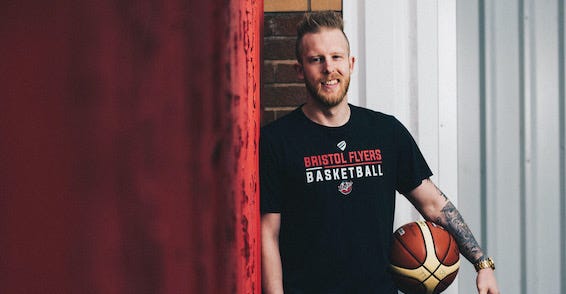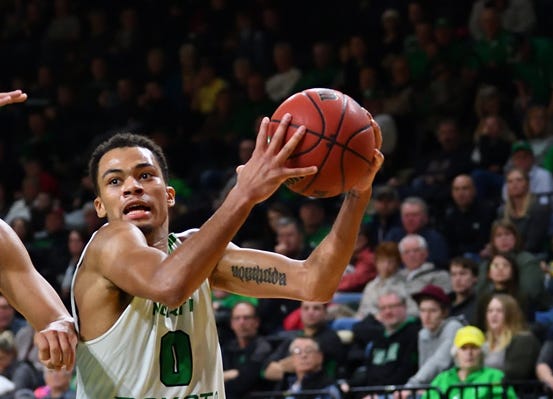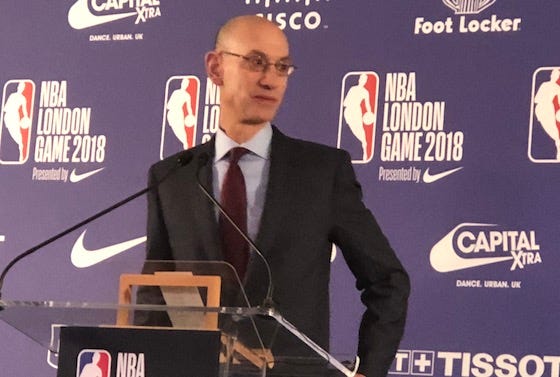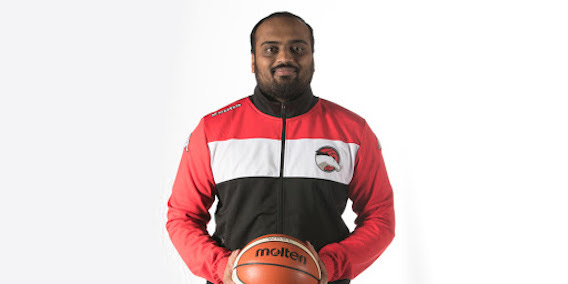Aussie Rules, OK?
Plus the BBL’s All Stars and lessons from the grassroots.
Welcome to the seventh edition of MVP’s regular newsletter, The Post Up.
In this issue, we talk to Bristol Flyers guard Josh Wilcher about the success of Australian basketball – at a pro level and in developing NBA talent. We reveal who this season’s BBL All Stars would be, hear from one of the country’s leading grassroots coaches on how to foster stars of the future and hear news on the NBA’s future return to London.
If you like The Post Up, please consider supporting MVP and tell your friends all about newsletter. Thanks for reading.
No Josh-ing, there are Wizards in Oz
On the other side of the world from home, Josh Wilcher admits he’s happily settled in the UK and putting down roots.
In the first season of a two-year deal with Bristol Flyers, the Australian point guard already had his British passport in his kitbag with a wife from here to boot. A month past his 30th birthday, his future post-hoop career plans are already in train.
“Since I was little, I had two loves basically,” he reveals. “And that was to be a police officer and to play basketball. And I feel like I've ticked one. So I guess, if I can, that's sort of the next step in my life.”
Yet the future PC remains wedded to his homeland. And grateful for a system that nurtured him so well until an untimely Achilles tear forced him out of the sport for a year – and then onto an alternative pathway that brought him to his second country, and onwards to the BBL via a re-start campaign with Reading Rockets.
A product of Melbourne Tigers and their development programme, he was immersed in a pyramid that has churned out NBA performers by the dozen.
Australia just does sport well, he declares. It’s a culture that encourages kids to aim high.
“So anything you jump into - whether it be football, rugby, basketball, netball, anything - you've got a pathway to succeed, which is really good,” he outlines.
“And I'm not sure a lot of other countries have that way. You could sort of pick whatever you want, and then you could flourish in it, you know. So I am very fortunate to come up that way.
“But if I had to chose another sport, you would have had the exact same upbringing you know, where you can follow all the channels and then get to where you want to.”
Coming through the ranks, he saw peers go above and beyond. “I played with Matthew Dellavedova for my State,” he says. “And Ryan Broekhoff who played in the NBA last year. And then, when I was in the NBL when the lockout season was on, Patty Mills signed for our team.”
Stars flourishing on the other side of the Pacific. Ideal role models.
But, in a example of the opportunities and threats for the BBL and WBBL to explore, it was not the bright lights of the NBA that thrilled and inspired a young Wilcher most.
“My idols were already in my own country,” he recalls. “Whereas now it's sort of like everyone wants to be an NBA player and wants to look up to that.
“But I think it is getting back to that point where people want to play in the NBL, rather than playing in the NBA, which is crazy, you know. But it's fantastic for Australian basketball.
“So when I was younger, I only had to drive to watch a game to see who I was looking up to. Everyone loves the NBA, and Michael Jordan and Scottie Pippen. But my own idols, were at my own club, and were in my own state. So I was pretty fortunate to see first-hand what it looks like.”
The NBL has resurrected itself from the darkest of places during the past decade, having seemingly followed a journey in parallel with Britain. A boom in the eighties when Birmingham Bullets and Sydney Kings were co-owned and operated by the brothers, Harry and Mike Wrublewski.
Then a similar bust.
Until real estate magnate Larry Kestelman bought a 51 per cent stake in the league in 2015 for AUS$7 million (£3.8m) and brought investment and a centralising force.
Since then, there has been attendance records, increased TV and digital viewers and even a push to lure prime young American talent Down Under with LaMelo Ball, now favourite to be NBA Rookie of the Year with the Charlotte Hornets, opting to spend his actual first professional season with the Illawarra Hawks over going to college.
There is stability, with contracts too. That helps in every aspect of selling the game, Wilcher offers.
“Just the whole branding, they do it very professionally with the social media, with how they look after their players,” he says.
“With the BBL, it's sort of a shorter stint. So there's a lot of chopping and changing. Whereas in Australia, you've got a set number of guys - it's not a whole bunch of fresh faces. So it's easy for people to look in and follow someone's career all the way through.
“In the BBL, it's like you've got a new guy every week on different teams. So I just think our product back home is set up to further longevity. Whereas the BBL, I was probably not at that point yet.”
Shades of what 777’s mooted £7.3 million injection of cash into the BBL could bring?
Perhaps.
But it is the developmental structure of the sport that is an enticing blueprint, Wilcher decrees.
“I've been over here enough to see how it all works over here. And it's just a different world back home. When I was a junior, so from 10-18 or maybe even younger, you had a club system where you're training two to three times a week, and you play age groups each Friday night.”
Even within a city like Melbourne, there was enough tests to push a young hopeful forward. Nationally, the roadmap was clear and with abundant help.
“Back home, we just sort of take the junior stuff really seriously,” Wilcher adds.
“We have a good base of developing players, whether it be NBA, whether it be pro guys, whether it be NBL. So for whatever reason, I think our junior situations are really set up to help players.
“And I think I think England's getting to that point where they're sort of producing some good talent and Scotland obviously… Back home, we put a real emphasis on the earlier years and tried to produce some talent.
“So hopefully, that comes over here.”
Listen to the full interview with Josh Wilcher in the latest edition of the MVP Cast
The 2021 BBL All Stars … revealed
Remember when the All Star Game that Nick Nurse coveted most took place in venues then called the NIA, the MetroArena and the MEN?
It’s a ten years since the BBL’s mid-season gathering of its great and good last took place, abandoned due to a diminishing return on investment in its cost and a lack of enthusiasm from players with the removal of additional financial incentives for taking part.
Its zenith – in my humble opinion – was the 1999 edition in Newcastle when Ted Berry hit 29 points but the South, helmed by Billy Mims, edged Nurse’s northerners 158-156.
A veritable A-List cast in an era where it was infinitely more common to see Americans remain in the UK for multiple seasons (and, yes, there wasn’t a single Brit in either line-up).
Amid Covid, the NBA All Star Game is still taking place in Atlanta in the early hours of our Monday morning.
This would definitely not be the year to revive the BBL All Star clash, as much as the idea has been intermittently re-floated over the past decade.
But, it’s as good a time as any to ask: ‘What would the two teams look like in 2021?’
When the last one was staged, it had moved to a Great Britain vs Rest of the World format but North against South was infinitely more fun.
Among the eleven clubs, there is an obvious geographic “northerliness” that starts above Leicester so that’s our arbitrary cut-off.
But how to pick the team?
Rather than going for personal choice, let’s use the best available metric.
PER (Player Efficiency Rating)
With a few qualifications. A player needs to have started the majority of his team’s league games. And played more than 20 minutes on average (inevitably one and the same). Plus they must still be in the country (sorry, Breaon Brady).
We’re also capping by position – 2 smalls, 3 bigs for starters. And five reserves of any mix.
That’s it.
So here is the MVP All Stars 2021.
North
Back court: Jeremy Hemsley, Kahron Ross
Front court: Ron Delph, Jimbo Lull, Antwon Lillard
Reserves: Jordan Whelan, Evan Maxwell, Justin Gordon, Rahmon Fletcher, Jalen Hayes
Hemsley is the highest-ranked PER-wise among the five northern clubs, weighted towards his shooting percentage. In a starting line-up, Rocks biggie Delph might seem an outlier for the strugglers but his shooting and blocks propel him upwards.
Newcastle have three reserves but Cortez Edwards just misses out with Brady’s decision to go home blowing up his chances despite topping the rebounding charts in pure numbers.
South
Back court: Geno Crandall, Justin Robinson
Front court: Marcus Delpeche, Chris Taiwah, Darien Nelson-Henry
Reserves: William Lee, DeAndre Liggins, Dirk Williams, Mike Morsell, Connor Cashaw
Yes, the Lion who might be the league’s MVP is on the bench. Phenomenal all-round but the former NBAer is trumped in efficiency by Bristol’s Marcus Delpeche and his own team-mate Chris Taiwah. Crandall leads the BBL in PER at 28.5 – five points to the good over the Flyers goliath.
And although Brandon Anderson of Worcester is 12th ranked he hasn’t played enough with his late arrival to be eligible, leaving the Wolves as the lone team without an All Star.
PS We’d love to do this for the WBBL too but their stats are … a bit basic.
NBA trips to Europe off the map
There will be no NBA games in London, or Paris, until at least 2023.
Speaking ahead of Sunday’s NBA All Star Game in Atlanta, the league’s Commissioner Adam Silver confirmed that international games are off the agenda amid attempts to regularise the schedule for next season in a post-pandemic environment.
Although some parts of the USA have allowed fans to return to arenas in restricted numbers, games continue to be postponed and the NBA will still face a late finish to its current season that threatens to run up against the Tokyo Olympics.
Problems which, Silver signalled, would make the resumption of games in Europe a headache.
“First of all, no plans yet to travel for next season,” he said. “In all likelihood, we won’t travel internationally until the following season at the earliest. But the plan remains to try to resume our season as close to so-called normal as possible next year.
“It was one of the reasons why, in setting the schedule this year, we decided to stop in mid-July. We both wanted to allow those players who wanted to participate in the Olympics to do so, but in addition we realised if we were going to get back on cycle, and the players were going to get the appropriate downtime before the season began, we didn’t want to go deep into the summer or fall, as we did last season.
“Frankly, I’m fairly optimistic at this point that we will be able to start on time, and that we have roughly half of our teams have fans in their arenas right now. If vaccines continue on the pace they are, and they continue to be as effective as they have been against the virus and its variants, we’re hopeful that we’ll have relatively full arenas next season as well.”
Paris staged the last European game in January 2020 following a switch from London which had been the venue for much of the previous decade.
Play the long game
How to create international-class bigs? Answer: Make them your point guard.
That’s the advice from the head of one of the UK’s most successful youth programmes: Falkirk Fury totem John Bunyan.
Located between Glasgow and Edinburgh, the Scottish League outfit has punched above its weight with three senior Great Britain caps over the past decade in Kieron Achara, Ali Fraser and Mairi Buchan – plus a cluster of Under-20 selections on top.
And Bunyan, who has overseen its rise, believes a culture of playing the long game has truly benefitted his prospects.
“I had Kieron playing point guard when he played for our Under-23 team in particular and the younger age groups,” he said.
“Kieron was so dominant inside. He was 6-10 with a 7-3 (220cm) wingspan as a 17-year-old. But our culture was to develop our players’ ball handling, shooting the basketball, developing shooting from range etc.
“Playing good defence. Posting up and our guards being able to post-up. We really still focus on giving them as many skills as possible.
“And Kieron was that guy. People would dribble past him who were a lot quicker, smaller guards. But then he’d use his arms to reach from behind and block them.
“He took that on board and when I went with him to Paris for a trial with Malaga, the guy looked at his ball handling skills and shooting. We’d encouraged him and those were the drills they were going through with him.”
Expanding on Falkirk’s much-admired ecosystem in an edition of the MVP Cast, Bunyan admits having 20 coaches involved in Zoom sessions with young players has helped keep basketball alive during lockdown.
There will be hurdles involved in re-starting. The significant Covid-related expenditure brought on by extra cleaning will be supplemented by cuts in numbers allowed inside facilities, pushing up the cost per user to a point where fears have been expressed about the viability of many sports centres.
But it has been important to prepare for whatever lies ahead, Bunyan underlines.
“We had a yearly planning programme for when we might get back training and playing,” he said.
“That competition side has been put back and back. Looking to the future, we are hopeful that 2021-22 season might start, particularly in younger age groups. Loads of clubs like ourselves have kids involved at Under-12 who have the fewest restrictions and the ability to train outside as normal.
“I think there is a degree of positivity. You’ve got to be positive. And we have to have that engagement with our parents as well in order to rebound.”
Swede success
Terrific news from Sweden in that Krumesh Patel, formerly of Leicester Riders’ WBBL side, has earned a three-year contract extension following his first season as head coach of Wetterbygden Sparks.
Not only that but his role is being extended to oversee the whole developmental pyramid of the club.
His record? 5-13, in ninth place. But it validates his decision to head overseas to extend his experience and utilise his knowledge from the Riders and Charnwood College to the full in a country where there is a long-term game at play along side any immediate results.
As their GM, Thomas Ekstrom said: “He has taken several of our young women's players this season to a whole new level in their development, so we look forward with great interest to what Krumesh will be able to achieve with our players seen in a longer term perspective.”
As Patel outlined when he was a guest on the MVP Cast, he has ambitions to reach the top of his profession via a route that probably outgrew the WBBL. Upwards and onwards, he said.
“The plan for Sparks in the coming years is set out: Next season, I aim for us to move the positions forward. To finish somewhere in places 5-6 in the SBL women’s league is the goal. And then we'll go into the top four.
“I'm used to being in a team that belongs at the top and that's where we're going with Sparks in the long run.”
Ford breached
Charlie Ford, Basketball England’s pathways manager is leaving, in a what is a significant loss for the organisation.
One of the few true basketball people in senior roles at the governing body, he revealed on social media that “with equal amounts of sadness and excitement, I have this week handed my notice in at Basketball England and will depart on the 27th April. There are so many amazing experiences, memories to reflect on.”
Ford had latterly acted as interim chief operating officer and had been a beacon of transparency in an otherwise unusually closeted environment. A huge blow.
ICYMI
GB’s Covid connection grounds Flyers
Giants part ways with Danny Byrne
Got a question for our Mailbag, a comment or want to reach out? Get us at @mvp_247 on Twitter or snail mail to mark@mvp247.com
Images: Ahmedphotos, Flyers, NBA






